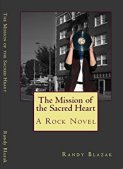December 21, 2017

This has been a weird year for music for me. The budget tightened as Cozy got bigger and the sabbatical cushion got smaller. Weekly trips to Music Millennium were replaced by lots of speaking engagements and news interviews about the rise of fascism in Trump’s America. I buried my ears in old John Coltrane albums as I read Ascension: John Coltrane and His Quest by Eric Nisenson. I spent a lot more listening time in 1964 than 2017, perhaps as an escape from the endless bad news of America going into the ditch. Just turn on KMHD radio and forget about the train wrecks (both literal and not) for a moment.
In my book, The Mission of the Sacred Heart, I posit a theory about the music of the seventh year of each decade. There is one pop album and one underground album that truly defines the decade. 1967: The Beatles’ Sgt. Pepper’s and The Velvet Underground & Nico, 1977: Saturday Night Fever and the Sex Pistols’ Never Mind the Bullocks, 1987: U2’s The Joshua Tree and Public Enemy’s Yo! Bum Rush the Show, 1997: The Spice Girl’s debut and Radiohead’s OK, Computer. The theory sort of falls apart with the death of the album in the 2000s. (You could make the case that 2007 fell to Kanye West and the White Stripes). But what will it be for 2017? It wasn’t exactly the Summer of Love 2.0. It may take years to figure out how we survived a year without a new Beyoncé album.

We did make it to a few great shows this year. Paul Weller in Seattle was probably my favorite and Solange in Portland was pretty epic. Beck and Spoon on the Portland Waterfront were mass entertaining. Runaway Lita Ford rocked Dante’s and getting to sing with Drivin’ N’ Cryin in Marietta, Georgia was a hoot. (Kevn Kinney introduced me as “Randy Blazak from U2!”) Herb Albert gave a master class in pop history at the Aladdin and Sting and Michael Kiwanuka brought some neo-soul to town. Bomba Estereo and Y La Bamba covered our Latin fixes. We had a great night with Shannon & the Clams and Portland garage kings The Shivas. However, I missed a ton of great gigs, choosing stay home and sing Frozen songs with Cozy.

I missed a lot of great music this year. I hear both the War on Drugs and Roger Waters have brilliant new albums out.. I know everyone has Kendrick Lamar’s DAMN at the top of their year-end polls. I loved his last one but I’m just tired of rap albums where every other word is “bitch.” It shows a lack of imagination, no matter how brilliant your commentary might be. The anti-Trump music is finally coming out. Jason Isbell’s “White Man’s World” is a chilling take on election day and I must have played “Fuck Donald Trump” by YG a hundred times on the binks jukebox. Maybe 2018 will be our 1968. You say you want a revolution? Well, you know. Is it streaming?
So this isn’t the best new albums of the year, just the ones I enjoyed the most, while Andrea painted and Cozy built increasingly impressive towers of blocks. I’ve already written about my complete submission to the joyous Harry Styles album, so it should be of no surprise that it tops my heart’s charts. We lost some greats, like Chuck Berry and Sharon Jones, and some old friends returned to remind us that, despite our foray into the Upside Down, great music will always sustain us.

- Harry Styles – Harry Styles
- Sharon Jones & the Dap Kings – Soul of a Woman
- Childish Gambino – Awaken, My Love!
- U2 – Songs of Experience
- SZA – Cntrl
- Sleater-Kinney – Live in Paris
- Tim Darcy – Saturday Night
- Jason Isbell & the 400 Unit – The Nashville Sound
- Dhani Harrison – In///Parallel
- Ringo Starr – Give More Love
- Paul Weller – A Kind Revolution
- Algiers – The Underside of Power
- Father John Misty – Pure Comedy
- Drivin N Cryin – Mystery Road Expanded Edition
- Portugal, The Man – Woodstock
- Chuck Berry – Chuck
- Cheap Trick – We’re All Alright
- Waterboys – Out of this Blue
- Big Thief – Capacity
- Dream Syndicate – How Did I Find Myself Here?
And Special Portland Topper: Jared Mees – Life is Long Besides being a perfect album, it gave me the theme song for my podcast, Recovering Asshole.














